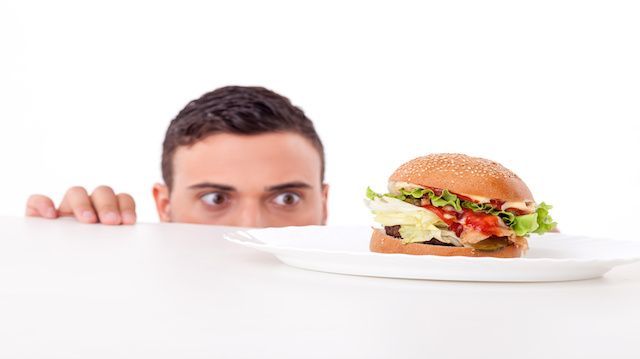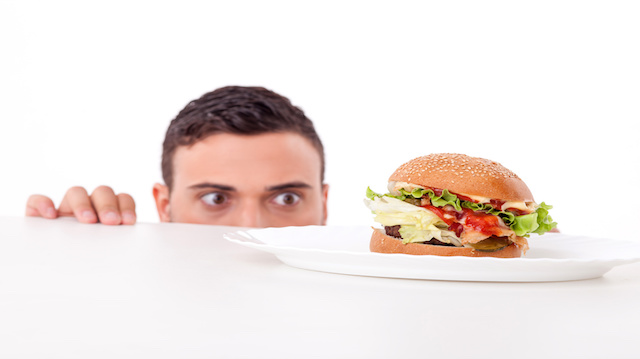
It’s happened to the best of us. You wake up in the morning with steely resolve, determined to have a day of healthy eating and to steer well clear of junk food. Next thing you know, you’ve got your hand deep in a packet of chips or a mouthful of chocolate muffin. How did that happen? It’s almost as if your brain subconsciously worked against you to ruin your carefully laid plans.
In fact, that’s exactly what has happened. Certain foods have been shown to trigger reactions in the brain, the most important of which is dopamine. Similar to the addictive effect of drugs, highly palatable foods, typically those rich in sugar, salt and (unhealthy) fat, trigger the release of “feel-good” chemicals, such as dopamine, in the brain.
This creates a reward pathway, whereby we now associate those foods with enjoyable feelings, and as a result feel an almost addictive need to eat more of them. The reward signals are often so strong that they override the usual feelings of satiety and satisfaction, meaning we keep eating even when we are no longer hungry.
The modern diet and food addiction
These food-based reward pathways may not have been so much of an issue prior to the industrial revolution and the subsequent easy access to mass-produced foods. Today, we have access to vast amounts of sugar-laden, salt-enriched foods, which present us with reward pathways that are far more intense than those we could ever have experienced from nature, as hunter-gatherers or basic farmers.
To make matters worse, in most countries around the world it is actually far easier and cheaper to buy these dopamine-inducing junk foods than it is to buy real, whole foods. The result is that obesity (and plenty of other nasty autoimmune diseases) is becoming a worldwide epidemic, with the United States leading the charge.
When the food addiction takes hold
Everyone is guilty of indulging in the odd junk-food binge: chowing down on a pizza and a bottle of coke while sitting in front of the TV after a long week at work, or eating too many delicious salty chips at an awkward work party. Generally speaking, this wouldn’t be considered a food addiction. So what are the signs to look out for?
While there are a range of symptoms, which can manifest as a food addiction, there are certain common behaviours that can help you to determine whether you or a loved one is suffering at the hands of tasty treats. These include the following:
- Eating more of a certain type of food than you had planned. For example, eating a whole bag of chips when you only intended to eat a handful. Sound familiar?
- Continuing to eat certain foods, even when you are no longer hungry.
- Eating so much that you actually feel sick.
- Worrying about no longer eating, or cutting down on eating, a certain food. This indicates that this particular food provides a strong reward pathway, and your brain is unwilling to give it up.
- When a given food is unavailable, going well out of your way to get your hands on it.
By themselves, any one of these symptoms would not necessarily mean you have a food addiction. But combined, you almost undoubtedly have a problem.
Left unchecked, a food addiction will continue to worsen, causing a vicious cycle that is difficult (but not impossible!) to stop. Let’s use pizza as an example. Eating pizza releases a surge of dopamine in the reward system, and repeatedly eating pizza overloads the brain and causes dopamine receptors to downregulate. This means that you now need to eat more pizza to get the same “buzz.” Thus, you enter the “tolerance” phase.
With fewer dopamine receptors, you’ll start to feel unhappy unless you get your regular fix of pizza. This is known as the “withdrawal” phase. Together, tolerance and withdrawal ensure that you are addicted to pizza, and are essentially a slave to your body’s cravings for it. As a result, whereas just three weeks ago you were satisfied after eating two slices of pizza, now it takes eight slices to satisfy your craving.
How to beat the addiction
Enough of the doom and gloom — it’s time to explore the options for overcoming a food addiction. Unfortunately there’s no single, magic piece of advice that can make it all go away, but there’s still plenty we can do:
 Adhere to a good meal plan. Those suffering from a food addiction often find it much easier to avoid eating a certain food when they’re sticking to a rigid meal plan. It’s important for that meal plan to provide sufficient healthy food, which prevents feelings of hunger and keeps cravings at bay.
Adhere to a good meal plan. Those suffering from a food addiction often find it much easier to avoid eating a certain food when they’re sticking to a rigid meal plan. It’s important for that meal plan to provide sufficient healthy food, which prevents feelings of hunger and keeps cravings at bay.
Develop a healthy relationship with food. Often, as someone’s addiction grows, they increasingly see food as “the enemy” and develop a love-hate relationship with food. It’s important to overcome this and start seeing food as nurturing and beneficial to the body. This can be achieved by adopting a diet such as the paleo diet, which is rich in nourishing whole foods and cuts out processed or refined products. When you begin to eat healthy food, you feel good about yourself, and don’t feel the same need to turn to an addiction food as a pick-me-up.
Remove addiction foods from your life. If a particular trigger food isn’t around, we are less likely to eat it. When overcoming a food addiction, the first and biggest step is to ensure you don’t have any of that food in your home. If necessary, ask a friend or family member to do your grocery shopping for you.
Consult a professional. Beating a serious food addiction is no easy task, and if the above steps don’t work, it is worth consulting a registered dietician and/or a licensed therapist to help you overcome your problem. It’s often best to consult both the dietician and therapist (or someone who specialises in both, if possible) as there are physical and psychological aspects to food addiction.
Beating food addiction isn’t easy. Let us know how you overcame your cravings, or what you intend to do after reading this article.
—Liivi Hess
Liivi is an Integrative Nutrition Health Coach and is training to become a doula. She inspires women to find peace and personal power by taking control of health and fertility naturally. Liivi‘s passion is ancestral nutrition and primal lifestyle design. She and her partner Will live between Toronto, Canada and Queenstown, New Zealand.
Sources:
http://europepmc.org/abstract/MED/26873452
http://europepmc.org/abstract/MED/26879210
http://europepmc.org/abstract/MED/26183302
http://europepmc.org/abstract/MED/26724725
http://europepmc.org/abstract/MED/26639078

